

Do dogs really need carbohydrates? Myth: DOGS NEED CARBOHYDRATES IN THEIR DIET.
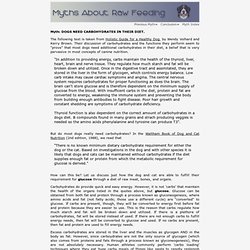
The following text is taken from Holistic Guide for a Healthy Dog, by Wendy Volhard and Kerry Brown. Their discussion of carbohydrates and the functions they perform seem to "prove" that most dogs need additional carbohydrates in their diet, a belief that is very pervasive in most concepts of canine nutrition. "In addition to providing energy, carbs maintain the health of the thyroid, liver, heart, brain and nerve tissue. They regulate how much starch and fat will be broken down and utilized. Once in the digestive tract and assimilated, they are stored in the liver in the form of glycogen, which controls energy balance.
Thyroid function is also dependent on the correct amount of carbohydrates in a dogs diet. But do most dogs really need carbohydrates? "There is no known minimum dietary carbohydrate requirement for either the dog or the cat. Is my vet really qualified to be giving nutritional advice? Myth: VETS ARE THOROUGHLY QUALIFIED TO DISPENSE NUTRITIONAL ADVICE.
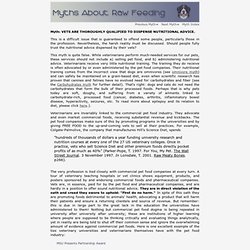
This is a difficult issue that is guaranteed to offend some people, particularly those in the profession. Nevertheless, the harsh reality must be discussed. Should people fully trust the nutritional advice dispensed by their vets? Are cooked diets a better alternative to raw? Myth: HOME-MADE, COOKED DIETS ARE A BETTER, SAFER ALTERNATIVE TO RAW.
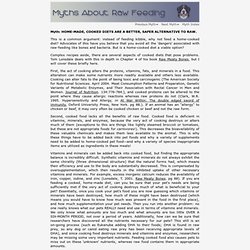
This is a common argument: instead of feeding kibble, why not feed a home-cooked diet? Advocates of this have you believe that you avoid all the 'dangers' associated with raw-feeding like bones and bacteria. But is a home-cooked diet a viable option? Complex recipes aside, there are several aspects of cooked diets that pose problems.
Tom Lonsdale deals with this in depth in Chapter 4 of his book Raw Meaty Bones, but I will cover these briefly here. First, the act of cooking alters the proteins, vitamins, fats, and minerals in a food. Second, cooked food lacks all the benefits of raw food. Vitamins and minerals can be added back into cooked food, but finding the appropriate balance is incredibly difficult. People compensate for vitamin and mineral deficiencies without resorting to supplements: they simply add vegetables, grains, and dairy products to their carnivores' diets. With all the premium kibbles available, is raw really necessary? Myth: THE AVAILABILITY OF MANY GOOD-QUALITY PREMIUM KIBBLED DIETS MAKES RAW UNNECESSARY .
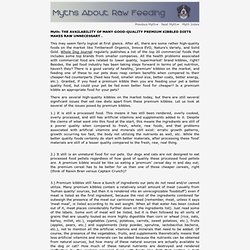
This may seem fairly logical at first glance. After all, there are some rather high-quality foods on the market like Timberwolf Organics, Innova EVO, Nature's Variety, and Solid Gold. Whole Dog Journal regularly publishes a list of the top 20 commercial foods that includes some top brands from smaller companies. All the health problems associated with commercial food are related to lower quality, 'supermarket' brand kibbles, right? Besides, the pet food industry has been taking steps forward in terms of pet nutrition, haven't they?
Are ground raw diets an acceptable alternative to RMBs? Myth: GROUND RAW DIETS ARE AN ACCEPTABLE ALTERNATIVE TO FEEDING WHOLE BONES.
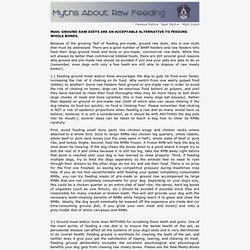
Because of the growing 'fad' of feeding pre-made, ground raw diets, this is one myth that must be addressed. There are a good number of BARF feeders and raw feeders who feed their dogs ground meat and bone or pre-made, commercial raw diets. While this will always be better than commercial kibbled foods, there are still several good reasons why ground and pre-made raw should be avoided if you and your pets are able to do so (remember, even dogs with only a few teeth are still able to dispose of raw meaty bones!). 1.) Feeding ground meat and/or bone encourages the dog to gulp its food even faster, increasing the risk of it choking on its food. First, avoid feeding small bony parts like chicken wings and chicken necks unless attached to a whole bird. 2.) Are raw diets very digestible? Myth: RAW DIETS ARE NOT VERY DIGESTIBLE.
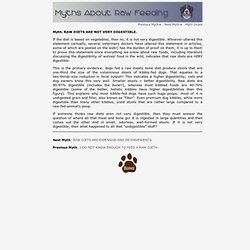
If the diet is based on vegetables, then no, it is not very digestible. Whoever uttered this statement (actually, several veterinary doctors have uttered this statement in articles, some of which are posted on the web!) Has the burden of proof on them; it is up to them to prove this statement since everything we know about raw foods, including literature discussing the digestibility of wolves' food in the wild, indicates that raw diets are VERY digestible. This is the primary evidence: dogs fed a raw meaty bone diet produce stools that are one-third the size of the voluminous stools of kibble-fed dogs. That equates to a two-thirds size reduction in fecal output!! Do different breeds need different diets?
Myth: DIFFERENT BREEDS OF DOGS NEED DIFFERENT KINDS OF DIETS.
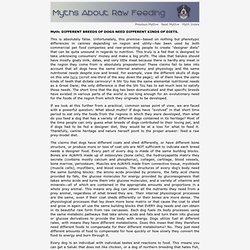
This is absolutely false. Unfortunately, this premise—based on nothing but phenotypic differences in canines depending on region and utility—has been used by both commercial pet food companies and raw-promoting people to create "designer diets" that can be quite unsound in regards to nutrition. This truly is a fad that is designed to take unknowing consumers' money and make a big profit. The idea that Salukis should have mostly goats milk, dates, and very little meat because there is hardly any meat in the region they come from is absolutely preposterous! These claims fail to take into account that all dogs have the same internal anatomy and physiology and the same nutritional needs despite size and breed. If we look at this further from a practical, common sense point of view, we are faced with a powerful question: What about mutts? Every dog is an individual with individual tastes and reactions to food.
Will raw meat make my dog bloodthirsty? Myth: RAW MEAT WILL MAKE MY DOG BLOODTHIRSTY.
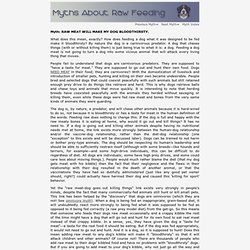
What does this mean, exactly? How does feeding a dog what it was designed to be fed make it bloodthirsty? By nature the dog is a carnivorous predator. A dog that chases things (with or without killing them) is just being true to what it is: a dog. Aren't raw diets expensive and inconvenient? Myth: RAW DIETS ARE INCONVENIENT AND EXPENSIVE.
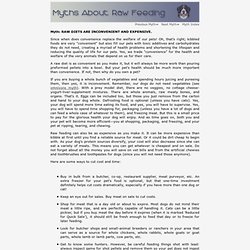
Since when does convenience replace the welfare of our pets! Oh, that's right; kibbled foods are very "convenient" but also fill our pets with toxic additives and carbohydrates they do not need, creating a myriad of health problems and shortening the lifespan and reducing the quality of life for our pets. Yes, we trade "convenience" for the health and welfare of the very animals that depend on us for their care. Do I know enough to feed raw? Myth: I DO NOT KNOW ENOUGH TO 'MAKE' MY PET'S FOOD/FEED HIM A RAW DIET.
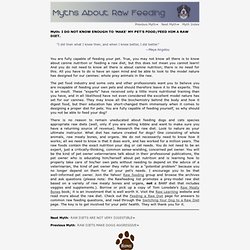
"I did then what I knew then, and when I knew better, I did better. " —Maya Angelou You are fully capable of feeding your pet. True, you may not know all there is to know about canine nutrition or feeding a raw diet, but this does not mean you cannot learn! Is there scientific research to back raw diets? Myth: THERE IS NO SCIENTIFIC RESEARCH TO BACK RAW DIETS. "You know, the very powerful and the very stupid have one thing in common. They don't alter their views to fit the facts. They alter the facts to fit the views, which can be uncomfortable if you happen to be one of the facts that needs altering.
" — Dr. Who The implication here is that because there is "no scientific research" performed by institutions like the American Veterinary Medicine Association (AVMA), raw diets should not be fed. What about raw diets and the AAFCO standards? Myth: RAW DIETS DO NOT MEET THE AAFCO STANDARDS AND ARE INFERIOR TO COMMERCIAL FOODS. Vets, canine 'nutritionists', and pet food companies will tell you that raw diets do not meet the established standards for pet nutrition—the Association of American Feed Control Officials (AAFCO) standards. AAFCO approval is the "Golden Seal" of quality when it comes to pet foods, and because raw diets do not have this seal of approval, many imply that they are inferior to commercial foods. But what are the AAFCO standards?
How did AAFCO come up with these standards? Should they be viewed as the "Golden Seal of Approval? " AAFCO standards and nutrient profiles were established through collaboration between scientific experts in the industry, in academia (such as universities), and in the regulatory commission (National Research Commission, or NRC). Are raw-fed pets a health risk for humans? Myth: RAW-FED ANIMALS POSE A SIGNIFICANT HEALTH RISK TO HUMANS. This is a myth made possible by our society's pathological fear of bacteria. Of the millions of bacteria on this earth, it is estimated that less than 1% are harmful. Media and society as a whole have played up bacteria, painting it as an evil nemesis that must be stomped out with disinfectants, antibacterial everything, and unnecessary vaccination.
This has resulted in the emergence of super-bacteria and "super-viruses", no thanks to the improper use of antibiotics and the plethora of antibacterial soaps and products. Developmental biologists have recently learned that bacterial exposure is absolutely necessary for the development of a healthy immune system, among other things. Will my dog aquire parasites from raw meat? Myth: MY DOG WILL ACQUIRE PARASITES FROM THE RAW MEAT IN A RAW DIET. Yes, there can be parasites in raw meat. But if you are getting meaty bones and carcasses from places fit for human consumption, the parasite factor is negligible. Most parasites are a non-issue and can be safely dealt with by your dog if it is healthy. The parasite issue is something than non-raw folk use as a scare tactic, telling you that your dog is going to die if it eats raw meat because it will get a weird parasite.
They neglect to tell you the very low incidence of these parasites in meat deemed safe for human consumption; nor do they tell you the most "deadly" of these parasites come from things like infected sheep placentas or stillborn calves. Freezing meat can help kill many parasites (such as the parasite present in salmon that CAN cause a deadly disease in dogs; freezing fresh raw salmon, steelhead, trout, and other salmonids for at least 24 hours before feeding effectively disposes of the parasite. Can toy breeds and small dogs eat a raw diet? Myth: TOY BREEDS AND SMALL DOGS CANNOT EAT A DIET OF RAW MEATY BONES. This is completely false! Of all the dogs that NEED a raw diet, toy breeds and small dogs (including brachiocephalic dogs like pugs) are the dogs that perhaps need it most! The teeth of small dogs are drastically overcrowded in their jaw, making them more prone to severe periodontal disease (and this is common knowledge among veterinarians).
Their teeth are packed into a small jaw, leaving very little space in between them and providing plenty of places for bacteria and plaque to develop and grow. Periodontal disease can then develop very rapidly, providing the harmful bacteria in the mouth immediate access to the rest of the animal's body. Have dogs adapted to cooked diets? Are dogs omnivores? Are dogs living longer because of kibbled food? Myth: DOGS ARE LIVING LONGER LIVES BECAUSE OF THE BETTER NUTRITION PROVIDED BY KIBBLE. Do wolves eat stomach contents of prey? Myth: WOLVES INGEST THE STOMACH CONTENTS OF THEIR PREY. Does the diet of wolves shorten their. Most dogs do well on kibble, so is raw necessary?
Are raw diets balanced? Will the bacteria in raw meat hurt my dog? Are dogs too far removed from wolves to be fed raw food?